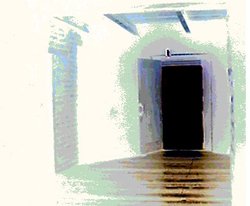|
In the ancient city of Mainz, there lived a young scholar named Rabbi Shimon Hagadol. He became renowned for his beautiful religious poems, known as piyutim. One day as he was composing a new poem, Elchanan, his little four-year old son, came in and looked at the paper.
"Father, you've written my name in the beginning of this poem!" 
"Yes, my son. This verse, 'E-lchanan nachalato' means, 'G-d is gracious unto His heritage.' You see, every Jew has a share in G-d's heritage. If a Jew strays (G-d forbid) from this heritage, from the Jewish way of life, G-d, in His gracious love of His children, helps him to return." A tear appeared in the boy's dark little eyes. "I will never stray from my heritage," he exclaimed.
A few days later, little Elchanan fell ill. His fever rose and he lapsed in and out of consciousness. While his parents wept and prayed for his recovery, their Christian maid, Margaret, also wept, for she loved the bright little boy. She had always harbored the hope that one day she might convert him to Christianity. Now she vowed that if he recovered, she would take him to a monastery where he would grow up as a Christian.
By the time Passover arrived, the child had recovered, and although he was still weak, he managed to join in the family seder and even ask the Four Questions. The following morning, his parents went off to the synagogue, leaving Elchanan with the maid. When they returned several hours later, they were stunned to find that both Elchanan and Margaret were gone. Rabbi Shimon searched for the boy door to door, but no one had seen his precious child; he was lost.
Margaret brought the child to the monastery, but in his weakened state, he caught a chill and became even more ill than before, coming down with a raging fever. With the greatest care, Margaret nursed him back to health, but when he recovered, he had completely lost his memory. When he asked about his parents, he was told that he had been left at the monastery door. Eventually, he stopped asking.
The young boy, now known as Felix, was extraordinarily bright and within a short time, he was sent to Rome where he continually rose in the ranks of the Church, becoming a bishop, then a cardinal. When Pope Gregory VII died, Cardinal Felix was elected pope, choosing the name Victor III.
One day, Pope Victor received a petition from the Rabbi of Mainz, pleading for an audience. The Jewish community of Mainz was threatened by a cruel decree put in place by the local anti-Semitic clergy and the rabbi hoped for some justice from the pope. Pope Victor agreed to the audience, and the Rabbi of Mainz arrived. The rabbi recounted the plight of the community, and the pope was greatly moved by his account and agreed to annul the decree. The pope was attracted by the rabbi's stately appearance and dark, penetrating eyes. When the meeting ended, the pope asked the rabbi to return the following day to discuss a religious matter.
The next day, the old Rabbi of Mainz arrived and the pope received him warmly. They engaged in a lively and wide-ranging discussion. When the pope heard that the rabbi had a special interest in composing religious poetry, he asked to see some examples of it. But as the rabbi was about to hand the pope some manuscripts, a tear unexpectedly rolled down the old rabbi's face. "Excuse me, Your Excellency, but these poems always bring up an old sorrow. You see, I once composed a poem in honor of my beloved son who was kidnapped from us when he was only four years old. I carry it with me always."
The pope was deeply touched and asked, "May I see that poem?"
The rabbi handed him a parchment, which the pope carefully unfolded. As he began to read the words, "G-d is gracious unto His heritage," he paled.
"Father, dear father!" he cried as he embraced the old rabbi.
"My son!?" Rabbi Shimon whispered, but then he covered his face with his hands and said, "How can I call you 'son' -- you are no longer my son!"
"Oh no, father," did you not explain to me that G-d is always there to accept his wayward children who stray?"
"Yes, I remember. But do you recall your words to me that day?"
"Father, I was very ill and lost my memory. But now, the shock of being reunited with you has brought it all back to me. Father, I want to return to you!"
Several days later the cardinals assembled to await the pope's arrival at mass, but he never came.
There was much speculation about what could have happened to the Pope. Some said that he had ascended to Heaven. Others suggested that he had adopted a life of hardship and poverty to atone for the sins of Christians. But no one could have imagined that he had forsaken a life of wealth and power to return to his downtrodden and persecuted Jewish brethren.
Adapted from Talks and Tales
|
